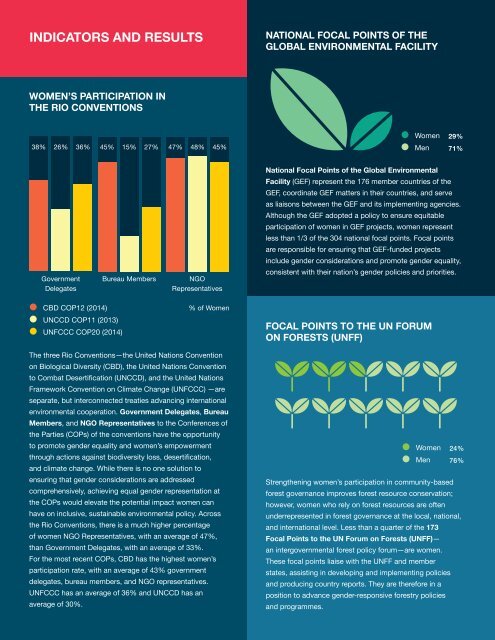Women’s Participation in Global Environmental Decision Making
STl2C
STl2C
You also want an ePaper? Increase the reach of your titles
YUMPU automatically turns print PDFs into web optimized ePapers that Google loves.
INDICATORS AND RESULTS<br />
NATIONAL FOCAL POINTS OF THE<br />
GLOBAL ENVIRONMENTAL FACILITY<br />
WOMEN’S PARTICIPATION IN<br />
THE RIO CONVENTIONS<br />
38% 26% 36% 45% 15% 27% 47% 48% 45%<br />
Women<br />
Men<br />
29%<br />
71%<br />
National Focal Po<strong>in</strong>ts of the <strong>Global</strong> <strong>Environmental</strong><br />
Facility (GEF) represent the 176 member countries of the<br />
GEF, coord<strong>in</strong>ate GEF matters <strong>in</strong> their countries, and serve<br />
as liaisons between the GEF and its implement<strong>in</strong>g agencies.<br />
Although the GEF adopted a policy to ensure equitable<br />
participation of women <strong>in</strong> GEF projects, women represent<br />
less than 1/3 of the 304 national focal po<strong>in</strong>ts. Focal po<strong>in</strong>ts<br />
are responsible for ensur<strong>in</strong>g that GEF-funded projects<br />
<strong>in</strong>clude gender considerations and promote gender equality,<br />
Government<br />
Delegates<br />
Bureau Members<br />
NGO<br />
Representatives<br />
consistent with their nation’s gender policies and priorities.<br />
CBD COP12 (2014)<br />
UNCCD COP11 (2013)<br />
UNFCCC COP20 (2014)<br />
% of Women<br />
FOCAL POINTS TO THE UN FORUM<br />
ON FORESTS (UNFF)<br />
The three Rio Conventions—the United Nations Convention<br />
on Biological Diversity (CBD), the United Nations Convention<br />
to Combat Desertification (UNCCD), and the United Nations<br />
Framework Convention on Climate Change (UNFCCC) —are<br />
separate, but <strong>in</strong>terconnected treaties advanc<strong>in</strong>g <strong>in</strong>ternational<br />
environmental cooperation. Government Delegates, Bureau<br />
Members, and NGO Representatives to the Conferences of<br />
the Parties (COPs) of the conventions have the opportunity<br />
to promote gender equality and women’s empowerment<br />
through actions aga<strong>in</strong>st biodiversity loss, desertification,<br />
and climate change. While there is no one solution to<br />
ensur<strong>in</strong>g that gender considerations are addressed<br />
comprehensively, achiev<strong>in</strong>g equal gender representation at<br />
the COPs would elevate the potential impact women can<br />
have on <strong>in</strong>clusive, susta<strong>in</strong>able environmental policy. Across<br />
the Rio Conventions, there is a much higher percentage<br />
of women NGO Representatives, with an average of 47%,<br />
than Government Delegates, with an average of 33%.<br />
For the most recent COPs, CBD has the highest women’s<br />
participation rate, with an average of 43% government<br />
delegates, bureau members, and NGO representatives.<br />
UNFCCC has an average of 36% and UNCCD has an<br />
average of 30%.<br />
Women 24%<br />
Men 76%<br />
Strengthen<strong>in</strong>g women’s participation <strong>in</strong> community-based<br />
forest governance improves forest resource conservation;<br />
however, women who rely on forest resources are often<br />
underrepresented <strong>in</strong> forest governance at the local, national,<br />
and <strong>in</strong>ternational level. Less than a quarter of the 173<br />
Focal Po<strong>in</strong>ts to the UN Forum on Forests (UNFF)—<br />
an <strong>in</strong>tergovernmental forest policy forum—are women.<br />
These focal po<strong>in</strong>ts liaise with the UNFF and member<br />
states, assist<strong>in</strong>g <strong>in</strong> develop<strong>in</strong>g and implement<strong>in</strong>g policies<br />
and produc<strong>in</strong>g country reports. They are therefore <strong>in</strong> a<br />
position to advance gender-responsive forestry policies<br />
and programmes.


